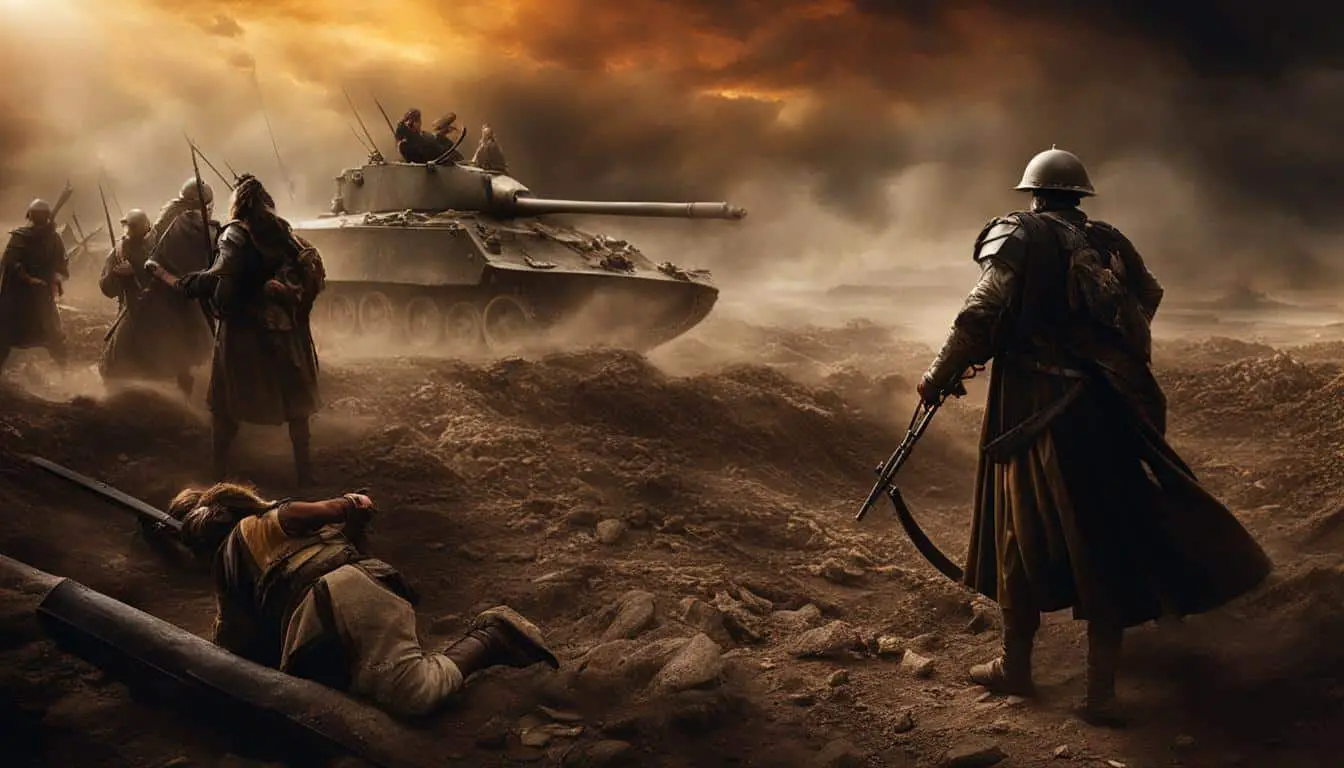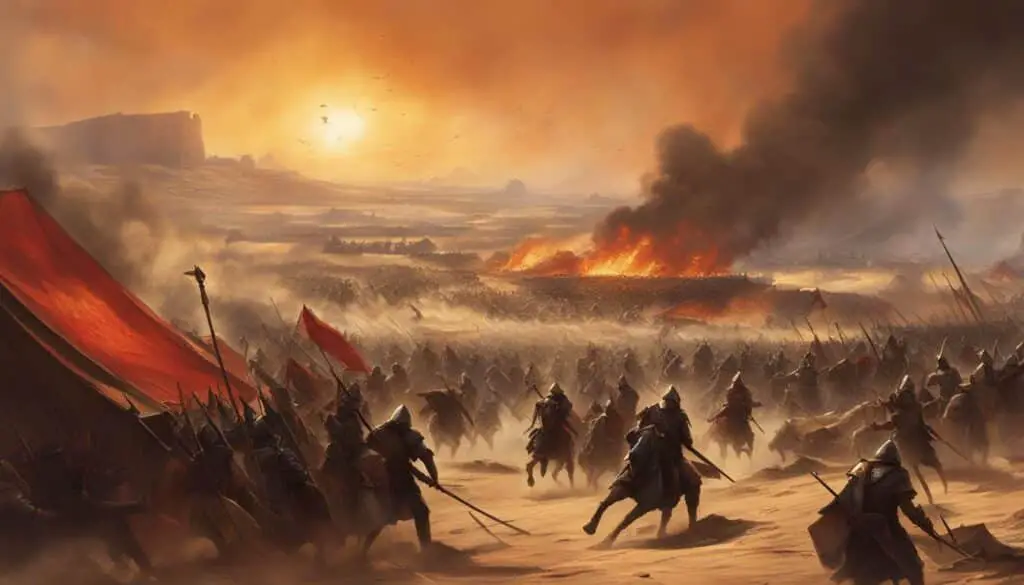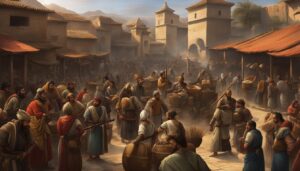
The Bible is a rich source of stories that explore the themes of war and conflict. From epic battles fought by the ancient Israelites to discussions on the justifications for war, these narratives provide not only historical insights but also valuable lessons on spirituality. In this section, I will delve into the war stories, conflicts, and battles found throughout the Bible, examining their historical context and analyzing the lessons they convey.
Key Takeaways:
- War and conflict play a significant role in biblical narratives, revealing insights into history and spirituality.
- The Old Testament contains detailed accounts of the Israelites’ conquests, offering lessons on leadership and military campaigns.
- The Bible presents various justifications for engaging in war, inviting us to reflect on the moral and ethical considerations.
- Studying these narratives can guide us in navigating conflicts, promoting peace, reconciliation, and the pursuit of justice.
- While the Bible portrays violence and warfare, it also emphasizes the importance of peace and seeking peaceful resolutions.
Wars in the Old Testament: A Study of the Israelite Conquests
The Old Testament is rich with accounts of wars and conflicts, providing us with valuable insights into ancient warfare and the heroes who led the Israelites to victory. These narratives not only shed light on the strategies, weapons, and tactics used in battle but also offer profound lessons that can be applied to our lives today.
One of the most prominent figures in the Old Testament is Joshua, who succeeded Moses as the leader of the Israelites. Under Joshua’s leadership, the Israelites embarked on a conquest of the Promised Land, engaging in numerous battles against the Canaanite nations. These stories highlight Joshua’s unwavering faith, his strategic brilliance, and his ability to unite and inspire the people. Through his example, we learn the importance of strong leadership, perseverance, and trust in divine guidance.
Another renowned war hero in the Old Testament is David, who defeated the giant Philistine warrior Goliath with a single stone. David’s military exploits, including his triumph over the Philistines and other enemies of Israel, demonstrate the power of courage, ingenuity, and reliance on God’s strength. David’s story serves as a reminder that even in the face of seemingly insurmountable challenges, faith and determination can lead to extraordinary victories.
| War Hero | Achievements |
|---|---|
| Joshua | Conquered the Promised Land, led the Israelites to victory against Canaanite nations |
| David | Defeated Goliath, triumphed over the Philistines and other enemies of Israel |
| Gideon | Delivered Israel from the Midianites with only 300 men, demonstrating the power of faith and strategic thinking |
Gideon is another notable figure in the Old Testament, known for his victory over the Midianites. Despite being outnumbered, Gideon and his small army of 300 men emerged victorious through careful planning and unwavering trust in God. His story teaches us the importance of resourcefulness, faith, and the ability to think creatively in times of adversity.
These stories of war heroes in the Old Testament not only inspire us with their bravery and leadership but also offer valuable lessons on resilience, trust, and the pursuit of justice. By studying these narratives, we can gain a deeper understanding of the complexities of warfare and the qualities that make a great leader. The wars in the Old Testament serve as a reminder that even in the darkest times, hope, faith, and determination can lead to triumph.

Justifications for War in the Bible: Examining Biblical Perspectives
The Bible contains numerous stories of violence and warfare, presenting various justifications for engaging in conflict. By delving into these narratives, we can gain insights into the perspectives on war held in biblical times. One of the key justifications explored in the Bible is the concept of holy wars, where nations fought in the name of their gods or for a higher spiritual purpose. These wars were often seen as acts of divine intervention and were believed to bring about justice or punishment for the enemies of God.
Another justification for war found in biblical narratives is self-defense. In certain situations, the Bible portrays war as a necessary means of protecting oneself or one’s community from harm. The defense of land, resources, and the preservation of one’s way of life were essential considerations in the decision to go to war. These stories shed light on the complex moral and ethical considerations surrounding the use of violence for self-preservation.
Additionally, the Bible presents scenarios where war is seen as a form of punishment for the enemies of God. These narratives illustrate a belief in divine justice, where the enemies of God are held accountable for their actions and face the consequences of their wrongdoing. The use of war as a means of punishment serves as a deterrent and a means to restore balance and order.
Violence in biblical stories serves as a backdrop for exploring moral dilemmas, examining human nature, and understanding the consequences of actions. Through an analysis of these narratives, we can gain a greater appreciation for the complexities surrounding war and the ethical considerations that come into play.
The Moral and Ethical Considerations of Biblical Warfare
While the Bible contains stories of violence and warfare, it also emphasizes the importance of peace, reconciliation, and the pursuit of justice. These themes provide a counterbalance to the accounts of war, highlighting the ideal of harmony and the desire to resolve conflicts peacefully. The Bible encourages followers to seek peaceful resolutions whenever possible and promotes the value of forgiveness and reconciliation.
Furthermore, the narratives in the Bible present opportunities for introspection and self-reflection. They invite readers to consider the motivations behind engaging in war, the extent to which violence should be employed, and the moral implications of such actions. By critically examining these stories, individuals can gain insights into their own beliefs and values regarding warfare and violence in today’s world.
| Justifications for War | Biblical Examples |
|---|---|
| Holy Wars | The conquest of Canaan by the ancient Israelites |
| Self-Defense | The defense of Jerusalem against Assyrian invasions |
| Punishment | The destruction of Sodom and Gomorrah |
Through an analysis of violence in biblical stories, we gain a deeper understanding of the complexities of war and the moral and ethical considerations that surround it. These narratives serve as a reminder of the importance of pursuing peaceful resolutions, while also recognizing the challenges and dilemmas that arise in the face of conflict.
Conclusion
The study of war and conflict in biblical narratives provides valuable insights into history, theology, and the human condition. Through the examination of these narratives, we can gain a better understanding of the complexities of war, its impact on societies, and the spiritual lessons they convey. While the Bible contains stories of violence and warfare, it also emphasizes the importance of peace, reconciliation, and the pursuit of justice.
By studying these narratives, we can find guidance on how to navigate conflicts in our own lives and strive for a more peaceful world. The analysis of biblical conflicts offers us an opportunity to reflect on the moral and ethical considerations surrounding warfare, allowing us to learn from the past and make better choices in the present.
Furthermore, the exploration of biblical warfare analysis helps us recognize the need for empathy, understanding, and dialogue when confronted with conflicts. By engaging with these narratives, we can develop a deeper appreciation for the multifaceted nature of war and its implications for individuals and societies.
FAQ
What are some examples of wars and conflicts in the Bible?
The Bible contains numerous stories of war and conflict, including battles fought by the ancient Israelites and discussions of justifications for war.
What can we learn from the war heroes in the Bible?
By studying the stories of war heroes like Joshua, David, and Gideon, we can analyze their leadership and gain valuable insights into military strategies and tactics.
What are the justifications for war presented in the Bible?
The Bible presents different perspectives on the use of violence, including concepts of holy wars, self-defense, and the punishment of enemies.
What can we gain from studying war and conflict in biblical narratives?
The study of war and conflict in biblical narratives provides insights into history, theology, and the human condition. It helps us understand the complexities of war, its impact on societies, and the moral and ethical considerations surrounding it.
Does the Bible emphasize peace and reconciliation despite containing stories of violence?
Yes, while the Bible contains stories of violence and warfare, it also emphasizes the importance of peace, reconciliation, and the pursuit of justice.








